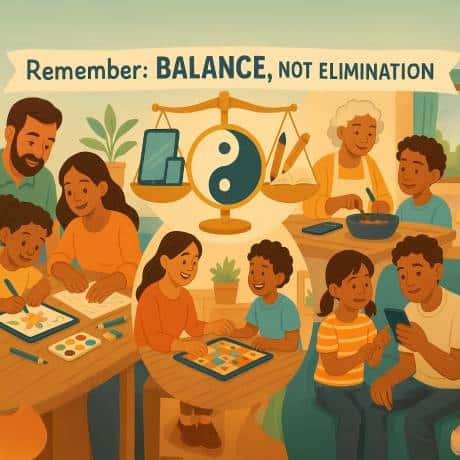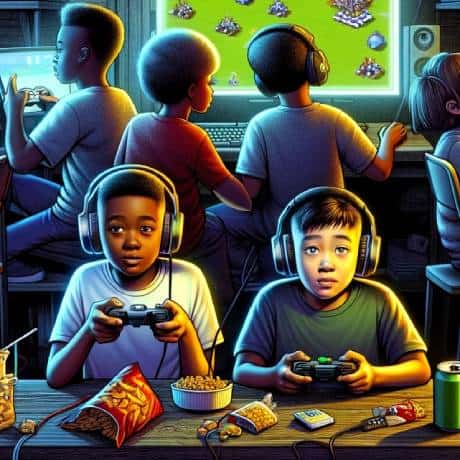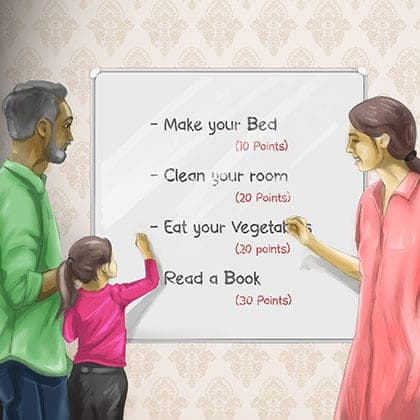Benefits of Sports for Children: 13 Reasons to Let Kids Play Sports
Author:
 |
Lionel Thomas Father, Gamer and Founder with a Passion for Health, AI, Environment and Gamification of Life. |
Author Tools:
- Grammarly (Spelling and Grammar)
- ChatGPT (Content Enhancements & Research)
- GSpeech (Audio by AI)
- Other Tools (AI)...
Artists:
- Roy Wibowo (Header)
- Lionel Thomas using DALL-E 2 [AI Generated] (Content)
References:
-
1. Benefits of Physical Activity
Centers for Disease Control and Prevention (CDC)
https://www.cdc.gov/physicalactivity/bas...
Summary:
Benefits of Physical Activity
1. Introduction:
- Physical activity plays a crucial role in promoting overall health.
- It has a profound impact on brain health, weight management, disease risk reduction, and daily function.
- All individuals, regardless of age, abilities, ethnicity, shape, or size, can benefit from being active.
2. Immediate Benefits:
- Boost in cognition for children aged 6 to 13.
- Reduced feelings of anxiety in adults.
- Aids in maintaining mental sharpness, mitigating risks of depression and anxiety, and promoting better sleep.
3. Weight Management:
- Balance between calorie intake and expenditure is key.
- Aiming for 150 minutes of moderate activity weekly, like dancing or yard work, can help maintain weight.
- More physical activity may be needed for some individuals to maintain or lose weight.
4. Reduced Health Risks:
- Cardiovascular Disease: Lower risk with at least 150 minutes of moderate activity weekly.
- Type 2 Diabetes and Metabolic Syndrome: Activity reduces the risk and even more activity provides additional benefits.
- Infectious Diseases: Active individuals are at a reduced risk of severe outcomes from diseases like COVID-19, flu, and pneumonia.
5. Strengthen Bones and Muscles:
- Essential for maintaining daily function and physical activity.
- Weightlifting and muscle-strengthening activities enhance or maintain muscle strength and mass.
- The benefits are especially crucial for older adults due to muscle and strength decline with age.
6. Improved Daily Activities and Fall Prevention:
- Active middle-aged and older adults have fewer functional limitations.
- Various activities, including aerobic, strengthening, and balance training, enhance physical function and reduce fall risk.
- Physical activity also reduces the risk of serious fall consequences, like hip fractures.
7. Increased Longevity:
- Boosting physical activity can prevent an estimated 110,000 deaths annually in the US for adults aged 40 and above.
- Increasing daily step counts also lowers premature death risks.
8. Management of Chronic Health Conditions & Disabilities:
- Helps in managing conditions like arthritis and type 2 diabetes by reducing pain, improving function, mood, and overall quality of life.
- Supports daily activities and independence for individuals with disabilities.
In conclusion, physical activity is pivotal for maintaining good health, managing weight, reducing disease risks, and ensuring a good quality of life. It's a universal solution suitable for everyone, irrespective of their personal characteristics.
-
2. Exercise and the Heart
John Hopkins
https://www.hopkinsmedicine.org/health/w...
Summary:
Exercise and the Heart Summary
Benefits of Exercise on Heart Health:
- Reduces blood pressure.
- Lowers the risk of diabetes.
- Helps in maintaining a healthy body weight.
- Reduces inflammation.
- Controls/modifies heart disease risk factors.
- Decreases the likelihood of smoking.
- Improves muscles’ ability to extract oxygen from the blood, thus reducing the heart's workload.
- Lowers stress hormones.
- Operates like a beta blocker, reducing heart rate and blood pressure.
- Increases "good" cholesterol (HDL) and manages triglycerides.
- Individuals who exercise regularly are at a decreased risk for sudden heart attacks and cardiac events.
Ideal Heart Exercise:
A combination of aerobic exercises (like jogging, swimming, and biking) with resistance training (like weightlifting) is recommended by the American Heart Association and the American College of Sports Medicine.
Exercise During Pregnancy:
For women who exercised before pregnancy, continuing a moderate routine is beneficial. For those not accustomed to regular exercise, milder exercise is recommended. Always consult a physician before making exercise decisions during pregnancy.
Resources:
The National Institute of Health, American Heart Association, and the American College of Sports Medicine provide guidelines and support for exercise routines. Johns Hopkins has a clinical exercise center offering evidence-based, medically supervised programs.
Frequency:
Aim for a minimum of 30 minutes of aerobic exercise at least five days a week and moderate weightlifting twice a week.
Monitoring Progress:
- Target Heart Rate: As fitness improves, one needs to exert more to achieve the same heart rate.
- Reps: Increase in the amount of weight that can be lifted 12-15 times indicates muscle strength and endurance.
- Body Composition: Loss of fat and gain of muscle, especially around the waist, signifies progress.
Avoiding Overexertion:
It's vital to stay within the target heart rate during exercise. Fatigue and soreness lasting more than a day or two might indicate overwork or potential injury.
Sticking to the Routine, to ensure consistency:
- Dedicate a specific time each day for exercise.
- Workout with friends or groups for support.
- Maintain an exercise log to track progress.
- Use technological tools like heart rate meters or speedometers for goal setting.
Effects of Regular Exercise:
Over time, regular exercise results in better oxygen consumption, longer exercise durations, and reduced heart rates and blood pressures. Dr. Stewart likens it to tuning up an engine, where the heart and circulatory system operate more efficiently.
-
3. The Importance of Sports to Health and Fitness
Serenity Sleepers
https://www.serenitysleepers.com/post/th...
Summary:
The Importance of Sports to Health and Fitness Summary
Introduction:
Playing sports is a scientifically proven method to enhance health and fitness.
Sports offer a fun alternative to traditional workouts.
Benefits...
Mood Enhancement:
- Reduces feelings of anxiety, depression, and stress.
- Increases production of endorphins, known for positive feelings and pain reduction.
Weight Loss:
- Increases metabolic rate and calorie burning.
Bone and Muscle Health:
- Helps build and maintain muscle and bone density.
- Participating in sports can prevent muscle loss with age and improve bone health to prevent osteoporosis.
Memory and Brain Health:
- Boosts blood flow to the brain and produces hormones for brain cell growth.
- Combined with yoga, sports can enhance brain function and prevent chronic diseases.
Skin Health:
- Reduces oxidative stress.
- Increases antioxidant production and improves blood flow to delay skin aging.
Sleep Quality:
- Playing sports enhances sleep quality by using up energy and regulating body temperature.
- A study showed that moderate sports can boost sleep quality by up to 65%.
Other Benefits:
- A great way for families to exercise together.
- Teaches resilience through wins and losses.
- Improves balance and reduces fall risks.
- Can assist in quitting smoking.
-
4. Benefits of Playing Sports for Kids
Love to Know
https://kids.lovetoknow.com/wiki/Benefit...
Summary:
Benefits of Playing Sports for Kids
By Karen Frazier
Introduction:
Engaging in sports provides children with numerous benefits, contributing positively to their holistic development.
Physical Benefits...
- Coordination and Balance: Sports participation helps kids develop better body control, enhancing their motor functions and balance, with lasting effects.
- Strength and Stamina: Engaging in sports strengthens muscles and increases stamina. It develops both fast twitch and slow twitch muscles.
- Body Composition: Kids involved in sports tend to have healthier body compositions, reducing risks of diseases like Type 2 diabetes.
- Lung and Heart Function: Active children usually have healthier cardiorespiratory systems.
Emotional Benefits...
- Positive Body Image and Self-Esteem: Sports engagement promotes a healthy body image, especially in girls nearing adolescence, and bolsters self-esteem.
- Stress Reduction: Participating in sports allows kids to channel their stress and aggression, potentially reducing depression and enhancing moods.
Mental Benefits:
- Sports aid in the development of strategic thinking, focus, and attention. The scoring involved in many sports can also enhance children's mental math abilities. These skills are valuable in classrooms and future workplaces.
Social Benefits:
- Sportsmanship: Sports teach kids about winning and losing, helping them deal with both outcomes gracefully.
Reduced Drug Use and Teen Pregnancy: Athletic kids have lower tendencies for drug and alcohol use, and girls in sports have a reduced risk of teen pregnancies.
- Leadership Skills: Sports activities hone leadership abilities, preparing kids for future challenges in life.
Conclusion:
Beyond just physical development, sports play a pivotal role in shaping a child's emotional, mental, and social well-being, making it a valuable aspect of child development.
-
5. Benefits of Youth Sports
U.S. Department of Health and Human Services Developed by PCSFN Science Board
https://health.gov/sites/default/files/2...
Summary:
Benefits of Youth Sports Developed by the PCSFN Science Board
Overview: The National Youth Sports Strategy seeks to ensure that all youth, irrespective of their background, have access to sports. Engaging in youth sports provides a range of benefits for young individuals, their families, and the broader community.
Mental, Emotional, and Social Health Benefits:
- Decreases in anxiety, depression, and stress.
- Enhancement in self-esteem, confidence, and life satisfaction.
- Reduction in suicide risk, substance abuse, and risky behaviors.
- Boost in cognitive performance, creativity, and general enjoyment of physical activities.
- Improved psychological well-being for those with disabilities.
Physical Health Benefits:
- Enhancement of bone health, weight status, and fitness levels.
- Reduction in risks of diseases like cancer and diabetes.
- Association with increased physical activity levels, cardiovascular fitness, and a decrease in body fat percentage, particularly in girls.
Educational and Career Success:
- Development of life skills like teamwork, goal setting, time management, empathy, and negotiation.
- Boost in qualities like determination, perseverance, grit, resilience, and critical thinking.
- Association with higher academic achievements and leadership qualities.
- Higher chances of attending and graduating from a four-year college for high school athletes.
Lifelong Participation Benefits:
- Continuation of sports participation into adulthood leading to sustained mental health benefits.
- Adults who played sports as youth believe that it reduces stress and enhances mental health.
- Youth who engage in sports are more likely to remain active in adulthood.
- Immediate psychological benefits from sports participation that can persist even after retirement from active sports.
Economic and Community Impact:
- Participation can result in significant health care savings, estimated up to $28 billion annually.
- Contribution to a robust long-term labor market.
- The benefits underscored here highlight the profound positive impacts of sports participation on the overall well-being and development of youth.
-
6. Benefits Of Team Sports For Kids
Australian Sports Camps
https://australiansportscamps.com.au/blo...
Summary:
Benefits Of Team Sports For Kids
Physical Benefits:
- Encourages regular exercise habits from a young age.
- Enhances bone and muscle strength.
- Promotes cardiovascular fitness.
- Assists in maintaining a healthy weight.
- Educates on the importance of a balanced diet.
- Reduces the risk of various illnesses and diseases.
Mental, Emotional, and Social Benefits...
- Happiness: Physical activity releases endorphins, which improve mood, alleviate stress, anxiety, and depression, boost self-esteem, and aid in better sleep.
- Teaching Values: Team sports inculcate values like respect (for coaches, teammates, opponents, and umpires), discipline, patience, and the understanding that team goals precede individual wants.
- Self-confidence: Participation in team sports helps kids face setbacks and challenges positively, seeing them as hurdles to overcome rather than as reflections of their personal shortcomings.
- Improved Communication: Team sports emphasize both verbal and non-verbal communication skills, teaching kids to listen, voice their thoughts, and comprehend body language and facial expressions.
- Time Management: Balancing sports with school and family tasks trains kids to manage their time efficiently, a skill they'll need increasingly as they grow older.
- Academic Achievement: Kids involved in team sports generally perform better academically, with studies like the 'Project Play' by the Aspen Institute revealing that such kids scored 40% higher on tests than non-athletic peers. They also displayed better behavior and respect in school.
- Support System: Besides family, sports teams provide kids with an additional support system, giving them an avenue to vent and stay away from negative influences.
- Friendships: Joining a sports team facilitates friendships across diverse backgrounds, promoting tolerance, acceptance, and providing a sense of belonging.
- Lifelong Memories: The experiences on the field – the victories, defeats, friendships, and lessons – are memories that last a lifetime.
-
7. Can Sports and Physical Activity Prevent Youth Substance Use?
Prevention Plus Wellness
https://preventionpluswellness.com/blogs...
Summary:
Key Findings:
- Daily sports and exercise can act as a protective factor against nonmedical opioid and heroin use.
- Boys involved in multiple sports teams are more likely to engage in extreme binge drinking.
- Participation in competitive sports, especially high-contact ones, is linked to higher odds of binge drinking and marijuana use.
- Generally, sports participation is connected with increased alcohol use, but decreased illicit drug use, especially non-marijuana related.
- Higher levels of athletic team participation are associated with both positive and negative substance use outcomes.
Interventions:
- Interventions that combine physical activity with substance use prevention can effectively decrease substance use while promoting physical activity.
- Specific programs have been successful in reducing alcohol, cigarette, and drug consumption among youths, while also encouraging more physical activity.
Conclusions:
The relationship between sports and substance use in youth is multifaceted. While participation in certain sports might elevate the risk for specific substance use, especially alcohol, it's generally protective against smoking and illegal drugs. The type of sport, gender, parental involvement, and level of exercise can influence these outcomes. It's vital to ensure youth involved in sports receive integrated programs that promote physical activity and substance use prevention. All youth, including college students, should have access to programs that encourage positive habits and deter substance misuse.
-
8. Developing life skills through sports
Health Direct
https://www.healthdirect.gov.au/developi...
Summary:
Organised sports offer numerous benefits for children, both physically and psychologically. These benefits extend beyond mere physical activities and play a pivotal role in a child's holistic development.
Key Takeaways...
Physical & Psychological Benefits:
- Organised sports contribute to both physical health and psychological well-being.
- Playing sports teaches children to manage their emotions and transform negative feelings into positive actions.
- Engaging in sports bolsters resilience and self-esteem in children.
Life Skills Through Sports:
- Sports isn’t just about physical health; it inculcates essential life skills.
- Participation teaches coping mechanisms for life's ups and downs.
- Losing in sports cultivates resilience by teaching children to handle disappointment.
- Playing sports fosters emotional control, patience, perseverance, and skill development.
Social Benefits:
- Team sports hone social skills needed throughout life.
- They instill values like cooperation, selflessness, and effective listening.
- Children gain a sense of belonging, expand their social circles, and learn the importance of discipline.
- Sports emphasize rule adherence, respect for decisions, understanding penalties, and the essence of teamwork.
Emotional Benefits:
- Physical activities stimulate brain chemicals enhancing emotional well-being.
- Participation in sports positively correlates with children's self-esteem. Achievements, team support, or even encouraging words from a coach can boost their confidence.
Role of Parents:
- Parents should ensure sports remain a positive experience for their child, emphasizing fun and activity over winning or losing.
- Parents should promote a positive attitude, praising efforts irrespective of the game's outcome.
- Sideline comments should be constructive, refraining from criticism or abuse towards any team, umpire, or player.
-
9. Associations between organized sports participation and mental health difficulties: Data from over 11,000 US children and adolescents
PLOS ONE (Journals)
https://journals.plos.org/plosone/articl...
Summary:
Purpose: To understand the relationship between participation in organized sport and mental health issues in US children and adolescents.
Data Source: Data Release 3.0 from the Adolescent Brain Cognitive Development (ABCD) study.
Sample Size: 11,235 US children and adolescents aged 9 to 13 years.
Method of Data Collection: Parents/guardians used the Child Behavior Checklist to self-report their child’s mental health difficulties.
Categories for Sport Participation:
- Participation in team sport.
- Participation in individual sport.
- Participation in both team and individual sport.
- Non-sport participation.
Findings...
Team Sport vs. Non-sport Participation:
- 10% lower anxious/depressed scores.
- 19% lower withdrawn/depressed scores.
- 17% lower social problems scores.
- 17% lower thought problems scores.
- 12% lower attention problems scores.
- 20% lower rule-breaking behavior scores for females compared to males.
Individual Sport vs. Non-sport Participation:
- 16% higher anxious/depressed scores.
- 14% higher withdrawn/depressed scores.
- 12% higher social problems scores.
- 14% higher attention problems scores.
Both Team and Individual Sport vs. Non-sport Participation:
- 17% lower rule-breaking behavior scores for females compared to males.
Conclusion:
- Team sport participation is linked to fewer mental health problems.
- Individual sport participation is linked to more mental health problems.
- Team sport may support child and adolescent mental health, consistent with past research.
Recommendation: More research is required to understand the potential negative impacts of individual sport participation on younger age groups.
-
10. Should Parents Worry About New Research Linking Kids’ Mental Health and Individual Sports?
Smithsonian Magazine
https://www.smithsonianmag.com/science-n...
-
11. Physical Activity and Its Impact on Health Behaviours Among Youth
World Health Organisation (WHO)
https://www.icsspe.org/sites/default/fil...
Summary:
Most studies have been conducted in the US, Canada, and Australia.
Research typically compares youths in organized sports programs to those not in such programs.
Positive effects of organized physical activity, termed as 'sport' in this report, are well-established:
Youths in sports tend to:
- Eat healthier.
- Have lower weight.
- Smoke less.
- Engage less in sexual activity.
Sports participation is linked with:
- Reduced alcohol consumption.
- Lower illicit drug use.
- Less involvement in violent activities.








 Snacks
Snacks Water
Water Eye Sight
Eye Sight Hearing
Hearing






















 Physical activities positively impact virtually every aspect of a child’s life. From good bodily development to mental health and even academic performance, sports bring various advantages to the table.
Physical activities positively impact virtually every aspect of a child’s life. From good bodily development to mental health and even academic performance, sports bring various advantages to the table.
 Screen Time
Screen Time Play Sports
Play Sports
